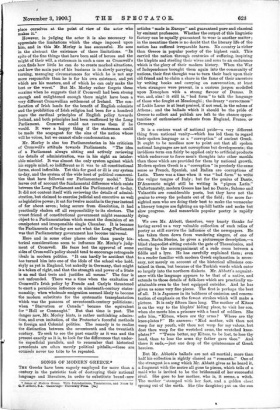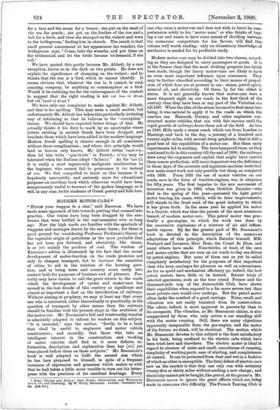SONGS OF MODERN GREECE.*
THE Greeks have been eagerly employed for more than a century in the patriotic task of destroying their national language and literature, in order to substitute brand-new Songs of Modern Greece. With Introductions, Translations, and Notes by G. Ir. Abbott, B.A. Cambridge : University Press. [61.]
articles "made in Europe" and guaranteed pure and classical by eminent professors. Whether the output of this linguistic factory can be equally guaranteed to wear is another matter; in the meantime there is no doubt that the literary life of the nation has suffered irreparable harm. No country is richer than Greece in popular poetry of the highest rank. This carried the nation through centuries of suffering, inspiring the klephts and steeling their wives and sons to an endurance which is the glory of their modern history. When the War of Independence brought them again into the community of nations, their first thought was to turn their back upon their old friend and to claim a share in the fame of their ancestors by writing books and carrying on conversation, at least when strangers were present, in a curious jargon modelled upon Xenophon with a strong flavour of Dumas. It was, and, alas ! it still is, "bad form" to talk the language of those who fought at Mesolonghi ; the dreary " correctness " of Lukis Laras is at least praised, if not read, in the salons of Athens ; and the ballads which it should be the pride of Greece to collect and publish are left to the chance oppor- tunities of enthusiastic students from England, France, or Germany.
It is a curious want of national pride—a very different thing from national vanity—which has led them to regard their spoken language as a "corruption" of ancient Greek. It ought to be needless now to point out that all spoken national languages are not corruptions but developments; the invidious term can fairly be applied only to artificial products which endeavour to force men's thoughts into other moulds than those which are provided for them by national growth. Modern spoken Greek is a " corruption " in precisely the same sense as French, Spanish, and Italian are corruptions of Latin. There was a time when it was "bad form" to write the vulgar tongue of Italy ; but for the genius of Dante, D'Annunzio might still be writing in "pigeon Latin." Unfortunately, modern Greece has had no Dante; Salomo and Valaoritis are considerable poets, but they have not the genius to sweep the pedants out of the field; the more far- sighted men who are doing their best to make the vernacular a literary tongue are fighting an up-hill battle and make but slow progress. And meanwhile popular poetry is rapidly dying.
We owe Mr. Abbott, therefore, very hearty thanks foz: having saved us a very valuable collection of such relics of poetry as still survive the influence of the newspapers. He has taken them down from wandering singers, of one of whom, Barba Sterios, he gives a picturesque description,—a blind rhapsodist sitting outside the gate of Thessalonica, and reciting to the accompaniment of a rude cross between a fiddle and a lyre. He has carefully explained them ; even to a reader familiar with modern Greek explanation is neces- sary, not merely on account of the historical allusions con- tained in them, but because of the Turkish words which enter so largely into the northern dialects. Mr. Abbott's acquaint- ance with the language appears to be that of a native, and extends to those details of folk-lore which are practically un- attainable even to the best equipped outsider. And he has given us some very fine pieces. The first is perhaps the best of all. It is Japanese in its boldness of omission and concen- tration of emphasis on the fewest strokes which will make a picture. It is only fifteen lines long. The mother of Xitsos is on the way to the klephts' hiding place, to visit her son, when she meets him a prisoner with a band of soldiers. She asks him, " Kitsos, where are thy arms ? Where are thy knee-plates F" He answers : "Mad mother, wilt thou not weep for my youth, wilt thou not weep for my valour, but dost thou weep for the wretched arms, the wretched knee- plates " " 'Twere better, my Kitsos, to be lost, to lose thy bead, than to lose the arms thy father gave thee." And there it ends,—just one drop of the quintessence of Greek heroism.
But Mr. Abbott's ballads are not all martial; more than half his collection is rightly classed as "romantic." One of the strangest is a song which Mr. Abbott gives as he heard it, a fragment with the metre all gone to pieces, which tells of a maid who is invited to be the bridesmaid of her successful rival. She goes to her mother, who is, it seems, a witch. The mother "stamped with her foot, and a golden chest sprang out of the earth. She (the daughter) put on the sun
for a face and the moon for a breast ; she put on the sand of the sea for pearls ; she put on the feather of the isos and a bell for a brow, and then she stamped on the walnut and went to the bridegroom," finding him in church. The result is that amid general amazement at her appearance (no wonder), the bridegroom says, "Come, take the wreaths, and put them on the bridesmaid, and let the bride become bridesmaid, if she will."
We have quoted this partly because Mr. Abbott, by a rare exception, leaves us in the dark on two points. He does not explain the significance of stamping on the walnut; and he thinks that the isos is a bird, which he cannot identify. It seems obvious that, whatever the isos is, it cannot, in such amazing company, be anything so commonplace as a bird. Would it be outdoing too far the extravagance of the context to suggest that the right reading is notTO_ Z., 7 _GOV T4 CPTEpo, but Tor, 'Irma/ TO Cp-rEpO We have only one complaint to make against Mr. Abbott, and that is his spelling. This may seem a small matter, but unfortunately Mr. Abbott has taken this particularly irritating way of informing us that he believes in the "corruption" theory. We should have expected better things of him. He actually thinks it his duty to mark by an apostrophe where letters existing in ancient Greek have been dropped, and brackets those which have been added in the modern language. Modern Greek spelling is chaotic enough in all conscience without these complications ; and where this principle would lead us heaven only knows. Mr. Abbott writes 'occpci'Prc ; then let him write " qua'ra'nte " in French ; xfy(E) may be tolerated when the Italians adopt " fa'nn(o)." As for (I), it is really a most ingeniously malignant misdirection to the beginner, who cannot fail to pronounce it iro instead of two. We feel compelled to insist on this because it is hopelessly unscientific, and seriously mars for educational purposes an excellent book which otherwise would have been conspicuously useful to learners of the spoken language, as it will, in any case, be for students of Greek poetry and folk .lore.























































 Previous page
Previous page